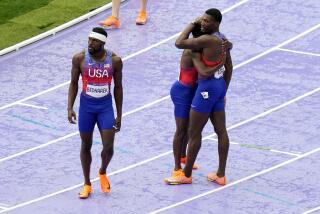U.S. Medal Would Be a Stretch
- Share via
PARK CITY, Utah — The U.S. Olympic men’s bobsled team hasn’t quite been able to put it all together. Maybe it’s bad equipment. Maybe it’s a bad start or bad driving. Or maybe it’s just bad luck.
When you put it all together, it amounts to a 46-year Olympic medal drought, and that dry spell looks safe for at least one more week.
Maybe U.S. drivers Todd Hays and Brian Shimer can get it together next Friday and Saturday in the four-man bobsled. In the two-man event Saturday at Utah Olympic Park, things came apart, as they almost always seem to when U.S. bobsledding and the Olympics collide.
Hays and brakeman Garrett Hines stood fifth after the first two runs with a time of 1 minute 35.41 seconds, .21 of a second behind third-place Martin Annen of Switzerland, with two more runs today.
Third is the best Hays can reasonably hope for, because he trails second-place Christoph Langen of Germany by a substantial .35. Langen, who won the two-man bronze medal in the 1998 Games in Nagano, was at 1:35.06, only .01 behind Switzerland’s Christian Reich.
Shimer, competing in his fifth Winter Olympics, was ninth in 1:35.91 with brakeman Darin Steele and blamed that disappointing finish in part on sled runners that were not a good match for Saturday’s relatively balmy temperatures.
Hays blamed his sled’s performance on himself and Hines.
“The first run, the start was great and I didn’t drive well,” said Hays, who established himself as a star on the 2001-02 World Cup circuit. “You can’t expect to drive like that and beat the Swiss and Germans.
“The second run, I drove well, but we didn’t start well.”
Hays and Hines had the second-best start time in the first heat but slipped to eighth on their second try. Hays had admitted to a case of the jitters on the eve of his first Olympic race but wasn’t certain if that was a factor Saturday.
“Nerves may have been part of it, I’m not sure,” he said. “I just know I didn’t drive real well.”
“It happens. It just can’t happen in the Olympic Games.”
Although .21 of a second is a healthy deficit, the former college linebacker and national championship kickboxer isn’t giving up. Hays figures that if he could fall that far behind in two runs, he can close the gap in two more.
“I think if we can put another one like this with a good start, we’ve got a chance, “ he said, referring to his second-run driving. “But it’s going to have to take two smokers, no doubt about it.”
Langen, considered the top driver here, has three Olympic medals in two Games. Reich’s highest finish in three Winter Games is a fourth in the two-man sled in 1998.
Langen, though, recently had to replace injured brakeman Marco Jakobs with Markus Zimmermann. Reich had an edge of .06 on Langen on their starts Saturday, but the German made up almost all of that with his unequaled driving.
“Differences of a hundredth of a second are what make this sport interesting,” Reich said. “Tomorrow, it doesn’t matter if you’re the hunter or the hunted. We both have gold in our sights.”
More to Read
Go beyond the scoreboard
Get the latest on L.A.'s teams in the daily Sports Report newsletter.
You may occasionally receive promotional content from the Los Angeles Times.






